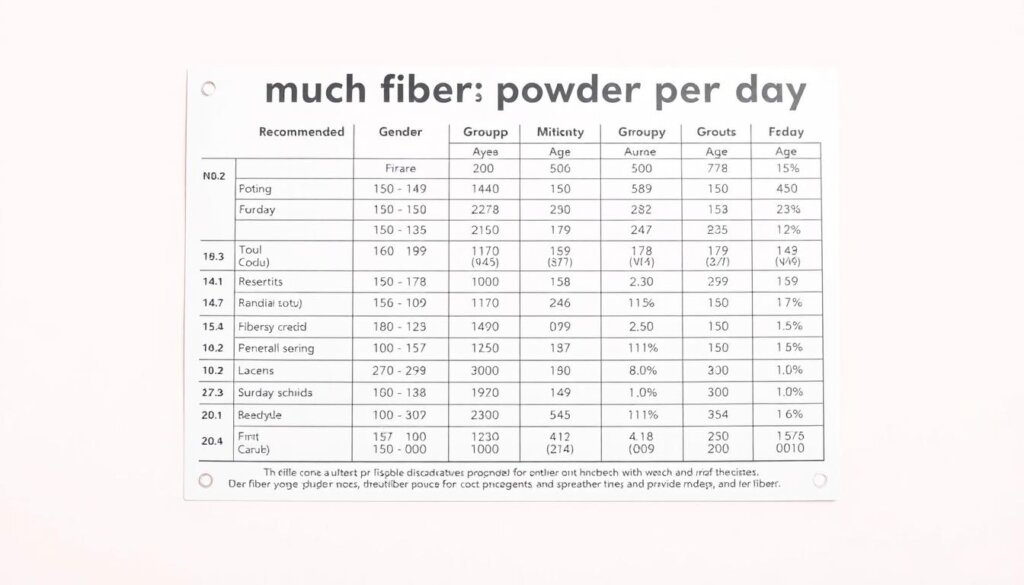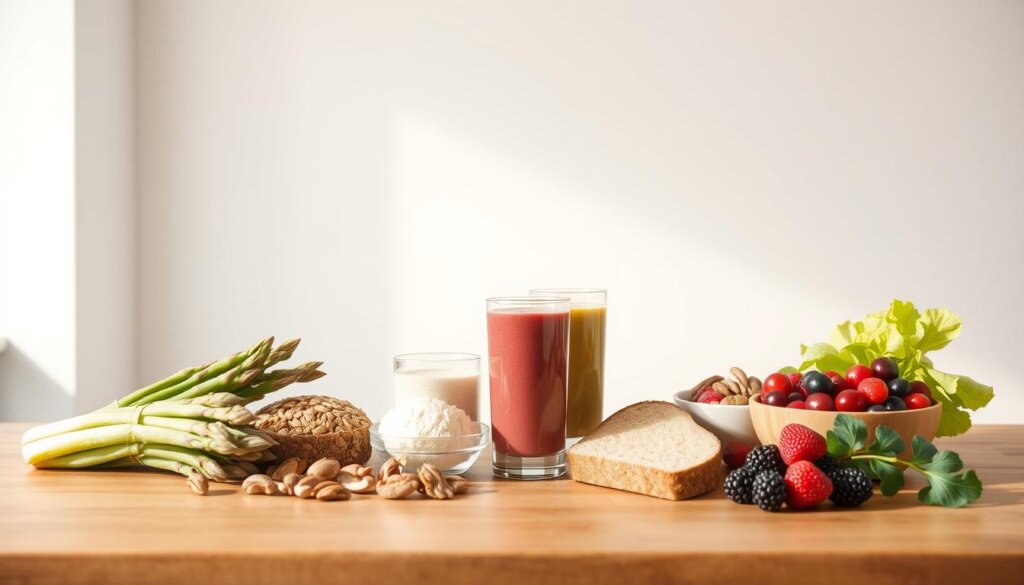Did you know 7 out of 10 adults consume less than half the recommended dietary fiber needed for optimal health? While guidelines suggest 28 grams daily for most adults, studies show the average intake hovers around 16 grams. This gap isn’t just a number—it’s a widespread nutritional shortfall impacting digestion, energy levels, and long-term wellness.
Fiber plays a vital role in maintaining gut health and stabilizing blood sugar, yet it’s often overlooked compared to vitamins or protein. For those struggling to meet their needs through whole foods alone, supplements like fiber powder can help bridge this deficit. However, determining the right amount requires understanding individual factors like age, activity levels, and existing signs of insufficient fiber intake.
While general recommendations provide a starting point, personalized adjustments ensure better results. Overdoing supplements without professional guidance can lead to bloating or nutrient absorption issues. On the flip side, too little might leave health goals unmet. Striking this balance is key to harnessing fiber’s full benefits.
Key Takeaways
- Most adults consume only 60% of their daily fiber requirements
- Supplements can address gaps but shouldn’t replace whole-food sources
- Needs vary by age, gender, and lifestyle factors
- Gradual adjustments prevent digestive discomfort
- Combining powders with water-rich foods enhances effectiveness
Understanding Dietary Fiber: Benefits and Sources
Hidden in everyday foods, dietary fiber is a powerhouse for wellness and vitality. This plant-based component remains intact through digestion, acting as nature’s cleansing crew for the gut while delivering surprising benefits far beyond regularity.
Nature’s Digestive Partner and Heart Protector

Click to 了解更多
Fiber works like a gentle scrub brush in the intestines, sweeping away waste to prevent constipation. Studies show it also traps excess cholesterol, helping maintain healthy blood flow and reducing heart disease risks. Its gel-forming soluble type slows sugar absorption, making it valuable for blood sugar management.
The Dynamic Duo: Soluble vs. Insoluble
Plant foods contain two fiber types working together:
- Soluble: Dissolves in water, found in oats, beans, and citrus fruits. Forms gel to nourish gut bacteria and stabilize blood sugar
- Insoluble: Adds bulk to stool, present in brown rice, veggies, and whole grains. Keens digestion moving smoothly
Combining both types supports weight management by promoting fullness and reduces diabetes risk. Emerging research suggests regular intake may even lower cancer risks, proving this humble nutrient’s far-reaching impact on health.
How much fiber powder per day? Guidelines and Recommendations
Nutrition needs shift across life stages, and fiber requirements are no exception. The USDA provides age-specific targets to help individuals meet their digestive and metabolic needs effectively.

Tailoring Your Intake
Current recommendations outline distinct needs:
- Women under 50: 25-28 grams daily
- Men under 50: 31-34 grams daily
- Adults over 51: 22-28 grams daily
Children require 14-31 grams based on growth phases. Active individuals or those consuming higher calories may need adjustments, as fiber needs often align with energy intake.
Global Perspectives on Fiber Consumption
While the American Heart Association advocates 25-30 grams from food, some populations consume 40+ grams daily. Research links these higher intakes to:
- Reduced diabetes risk
- Improved cardiovascular health
- Enhanced gut microbiome diversity
For those struggling with whole foods, supplements can help bridge gaps. Pairing them with hydration and strategic timing maximizes benefits while minimizing discomfort.
Experts advise gradual increases—adding 3-5 grams weekly—to allow digestive adaptation. This approach helps avoid bloating while working toward long-term health goals.
Strategies for Increasing Fiber Intake Naturally
Boosting daily fiber doesn’t require drastic changes—just smart swaps and creative additions. Many flavorful options make meeting targets enjoyable rather than overwhelming.
Whole Foods Rich in Fiber
Nature offers countless high fiber choices across food groups:
- Legumes: Lentils (15.6g/cup) and black beans (15.4g/cup) add protein-packed bulk
- Fruits: Raspberries (8g/cup) and pears (5.6g each) satisfy sweet cravings
- Grains: Barley (6g/cup) and oat bran (6g/cup) boost breakfast nutrition
Practical Daily Enhancements
Try these effortless upgrades:
- Swap white rice for quinoa in stir-fries
- Mix chia seeds into yogurt or smoothies
- Roast Brussels sprouts as crunchy snacks
Start with small changes—like choosing whole-grain bread—to let your gut adjust. Pair fiber-rich meals with water to aid digestion and reduce digestive disease risks.
For picky eaters, sneak grated zucchini into pasta sauces or blend oats into pancake batter. Global cuisines like Indian dals or Mexican bean salads offer delicious ways to enjoy variety while meeting targets.
Fiber Supplements vs. Natural Sources: Pros and Cons

Click to 了解更多
Choosing between whole foods and supplements for fiber needs can feel like navigating a nutritional crossroads. While fresh produce and grains deliver a powerhouse of benefits, modern lifestyles sometimes demand practical solutions.

When Supplements Shine
Whole foods remain the gold standard, offering fiber alongside vitamins and antioxidants. But certain situations make supplements valuable:
- Digestive conditions limiting high-fiber food tolerance
- Limited access to fresh produce during travel
- Temporary needs during dietary transitions
One study notes: “Supplements work best when paired with water and mindful eating—not as meal replacements.”
Balancing Quantity and Comfort
Overdoing supplements often backfires. Consuming more than 5 grams weekly without adjustment may cause:
- Gas and abdominal cramping
- Worsened constipation without enough water
- Nutrient absorption interference
Those with irritable bowel syndrome should approach fiber changes cautiously. Gradually increasing intake allows the digestive system to adapt while minimizing discomfort.
Always consult a healthcare provider before starting supplements, especially with medications. Remember: Natural sources nourish the body holistically, while powders serve as strategic helpers in specific scenarios.
Incorporating Wellness Group's Nutritional Expertise
Personalized nutrition guidance transforms generic advice into actionable results. While broad recommendations provide a foundation, individual factors like weight, medication use, and digestive sensitivity demand tailored solutions. This is where Wellness Group’s certified nutritionists excel, crafting plans that align with unique lifestyles and health goals.
Contact Wellness Group for Personalized Dietary Advice
Their team simplifies complex nutritional science through practical strategies. Whether managing blood sugar levels or optimizing fiber intake from diverse sources, experts analyze each client’s needs holistically. Reach them via WhatsApp at +60123822655 for consultations that consider:
- Preferred foods like barley or whole-grain bread
- Existing conditions such as diabetes risk
- Time constraints affecting meal prep
Operating Hours and How to Connect for More Information
Wellness Group maintains flexible hours to support busy schedules:
- Weekdays: 9:30 AM – 6:30 PM
- Weekends: 10 AM – 5 PM
They help clients enhance their diet without drastic overhauls—think adding peas to stir-fries or swapping white rice for nutrient-dense alternatives. With 95% of adults missing optimal fiber targets, professional guidance bridges the gap between intention and sustainable health habits.
Conclusion
Meeting daily fiber goals remains a common challenge, with many consuming less than half the recommended 28-34 grams. This gap impacts everything from gut function to blood sugar stability. Prioritizing whole-food sources like legumes, fruit, and whole grains builds a sustainable foundation for health.
Supplements can help bridge short-term gaps but work best alongside water-rich meals. Gradual increases—3-5 grams weekly—allow the digestive system to adapt smoothly. This approach reduces risks of constipation while maximizing benefits like heart protection and diabetes prevention.
Wellness Group’s nutritionists craft plans balancing dietary fiber intake with personal preferences and lifestyles. Their expertise helps clients enjoy a variety of foods while hitting targets. For those needing extra support, strategic use of supplements ensures safe, effective results.
Ready to optimize your intake? Connect with Wellness Group’s team for guidance tailored to your unique health journey. Small, consistent changes today create lasting benefits tomorrow.
FAQ
What are the benefits of adding more dietary fiber to meals?
Eating foods like oats, beans, and berries supports digestion, balances blood sugar, and may lower cholesterol. Soluble fiber in apples or barley helps heart health, while insoluble types in brown rice or whole-grain bread keep the digestive system moving smoothly.
Can supplements replace natural sources like fruits and vegetables?
While powders or capsules offer convenience, whole foods provide vitamins and antioxidants missing in processed options. Experts recommend prioritizing veggies, lentils, or quinoa first and using products like Metamucil or Benefiber only if dietary gaps remain.
What happens if someone consumes too much?
Overdoing it—especially with supplements—can cause bloating or cramps. Gradually increasing intake while drinking plenty of water helps the body adjust. Adults should aim for 25–38 grams daily, depending on age and calorie needs, as per USDA guidelines.
How can someone add variety to a high-fiber diet?
Mixing chia seeds into yogurt, snacking on almonds, or swapping white pasta for chickpea noodles adds nutrients without boredom. Roasted Brussels sprouts, edamame salads, or oatmeal with flaxseeds also boost daily totals deliciously.
When should someone consult a nutrition expert?
Those managing diabetes, IBS, or specific deficiencies benefit from tailored advice. Wellness Group’s team offers personalized plans—call +60123822655 between 9 AM–6 PM weekdays for support in balancing meals or choosing the right supplements.






